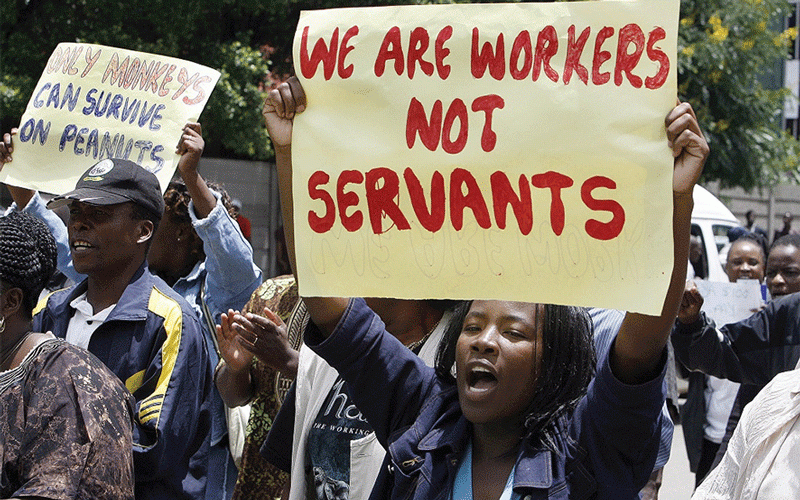
As schools opened last week, teachers under the Amalgamated Rural Teachers Union in Zimbabwe (ARTUZ) withdrew their labour in order to force the government to increase their meagre salaries.
Collective bargaining has been the common feature in the Zimbabwean context and this article seeks to unpack some of the legal issues, recommendations and challenges that workers face as they seek to force employers to increase their salaries.
Collective bargaining agreements in Zimbabwe according to the Labour Act [Chapter 28:01] are negotiated by registered or certified trade unions, employers and employer organisations or federations.
Collective bargaining is a process of negotiating the terms of employment between an employer and a group of workers.
The terms of employment include items such as working conditions, salary, work place rules, and retirement benefits and health care benefits.
In Zimbabwe the role of collective bargaining as an effective tool for industrial democracy and social justice has been compromised.
Collective bargaining has failed to solve industrial conflicts and the need to promote workplace democracy and ensure the recognition and promotion of worker’s rights has remained elusive.
Section 65 of the Labour Act protects key labour rights, including the right to fair and safe labour practice; the right to form, join and participate in the activities of a trade union; the right to strike; the right to reasonable working conditions; collective bargaining and fair remuneration.
- ED’s influence will take generations to erase
- ‘Govt spineless on wetland land barons’
- Govt under attack over banks lending ban
- Zim Constitution must be amended
Keep Reading
Of interest is the right to collective bargaining which is provided for in section 65 (5) (a) of the Constitution as well as section 74 of the Labour Act.
In order to promote and encourage the right of workers to collective bargaining different platforms were set up. The platforms in Zimbabwe to negotiate salaries for government workers include:
- National Joint Negotiating Council (NJNC) which is a collaborative platform bringing together government representatives and civil service unions to explore viable solutions and negotiate in good faith. It comprises teachers, civil servants and the employer representatives who meet quarterly to determine and establish levels of remuneration for teachers and other members of the public service.
- Unions such as Artuz and the Zimbabwe Teachers Association (Zimta) that represent teachers in salary negotiations
- Zimbabwe Congress of Public Sector Trade Unions (ZCPSTU) a union that represents government workers in salary negotiations
- Public Service, Labour and Social Welfare minister: The minister responsible for convening the NJNC and negotiating salaries with government workers
- Ministry of Public Service, Labour and Social Welfare: The ministry responsible for engaging with unions and negotiating salaries for government workers.
Despite these platforms, collective bargaining remains a difficult right for employees to enjoy.
The right is on paper but in reality everything exists to protect the interests of the ruling class, which is the employer, be it in public or private sector. It, therefore, remains that these platforms are not effective at all.
Currently, there is an outcry by teachers’ representatives that the government is failing to set up the mandatory meetings for the workers to further discuss the way forward and increase levels of salaries and allowances for teachers and this process is long overdue.
Leaving the obligation to call these quarterly meetings to the government is detrimental as they may dodge the meetings or delay them as they are currently doing. They do not have the best interests of their employees at heart.
In the private sector the negotiations are much more difficult in that in some instances, for example the plastic sector has different companies under it, producing different products which differ greatly in value.
For example a company that makes Jojo tanks is likely to make more money than those that make plastic bags making them capacitated to increase wages of their workers as per their demands , whereas, a company that generates less profits than the other is likely to be unable to agree on the amount set on negotiations.
With government negotiations, negotiations are expected to be easier since there is only one employer that is capacitated to pay its employees, yet they remain dodging employees when it is time for bargaining.
It is not clear whether it should be called collective bargaining or collective begging as the government seems reluctant to sit down with the representatives of teachers.
Because of the inefficiencies and inconsistencies that have occurred over the recent years, teachers feel short-changed and feel most of their submissions are not fully taken on board and are partially implemented.
Educators believe that the answer lies in collective bargaining reforms, which are long overdue.
Teachers are expecting to see an improvement in the way collective bargaining is conducted between the employer and its workers because they believe that the current system is not satisfactory to them.
The current negotiating system does not produce binding agreements that can be legally enforced should any of the two parties default on their word or obligations.
With the government unwilling to hear from its employees, teachers have embarked on a strike invoking their right to strike entrenched in section 65 (3) of the Constitution.
Workers are of the opinion that if negotiations fail each party should be allowed to use the power at their disposal.
The only weapon the employee can use is the right to strike. This right is poorly couched as it is not clear whether the right to strike is an independent right or merely a form of exercise of another right.
The right to strike is of cardinal importance in any labour law regime based on social justice and democracy in the workplace.
It is a concerted industrial action resulting in cessation of work calculated to persuade or cause a party to an employment relationship to accede to a demand related to employment.
It lies at the heart of the freedom of association, the right to organise and collective bargaining. The right has received acclaim under international law.
At common law strikes constitute a breach of contract entitling employers to summarily terminate the contract, but now strike is seen as a necessary adjunct to collective bargaining.
However, like all rights, the right to strike is not absolute, it is limited in the interests of other values and interests.
To acquire protection granted under the Labour Act, employees contemplating strike action must follow the prescribed statutory procedure in section 104 for it to be certified a lawful strike. As a result of the restrictive provisions many strikes have been declared illegal.
In practice, whenever workers are on strike the government retaliates by threatening them with job losses and at times they disperse the security forces to attack them. In the private sector employees fear to go on strike as they are likely to lose their jobs.
As already mentioned everything is done to suit the needs of the ruling class at the expense of workers. The right to strike is constitutionally guaranteed, but it is not guaranteed in real life.
The government has enacted laws as well that undermine the right to strike in the health sector.
The Health Services Amendment Act, 2022 states that strikes in the public health sector, which is considered as an essential service, must not go beyond 72 hours.
If unions fail to adhere to this time, the organisers will be fined or sentenced to three years in prison.
Workers’ rights are human rights that should neither be constrained nor compromised. What is even more worrisome is the criminalisation of freedom of expression.
The laws will have far reaching negative impacts that will narrow the rights of workers protected in the Constitution as well as the International Labour Organisation conventions. At the end of the day it is evident, that rights of workers are not prioritized by their employees.
- Mlondolozi Ndlovu is a Zimbabwean media practitioner and media trainer. He is an aspiring legal practitioner at the University of Zimbabwe & is contacted on 0778351296 or [email protected]









